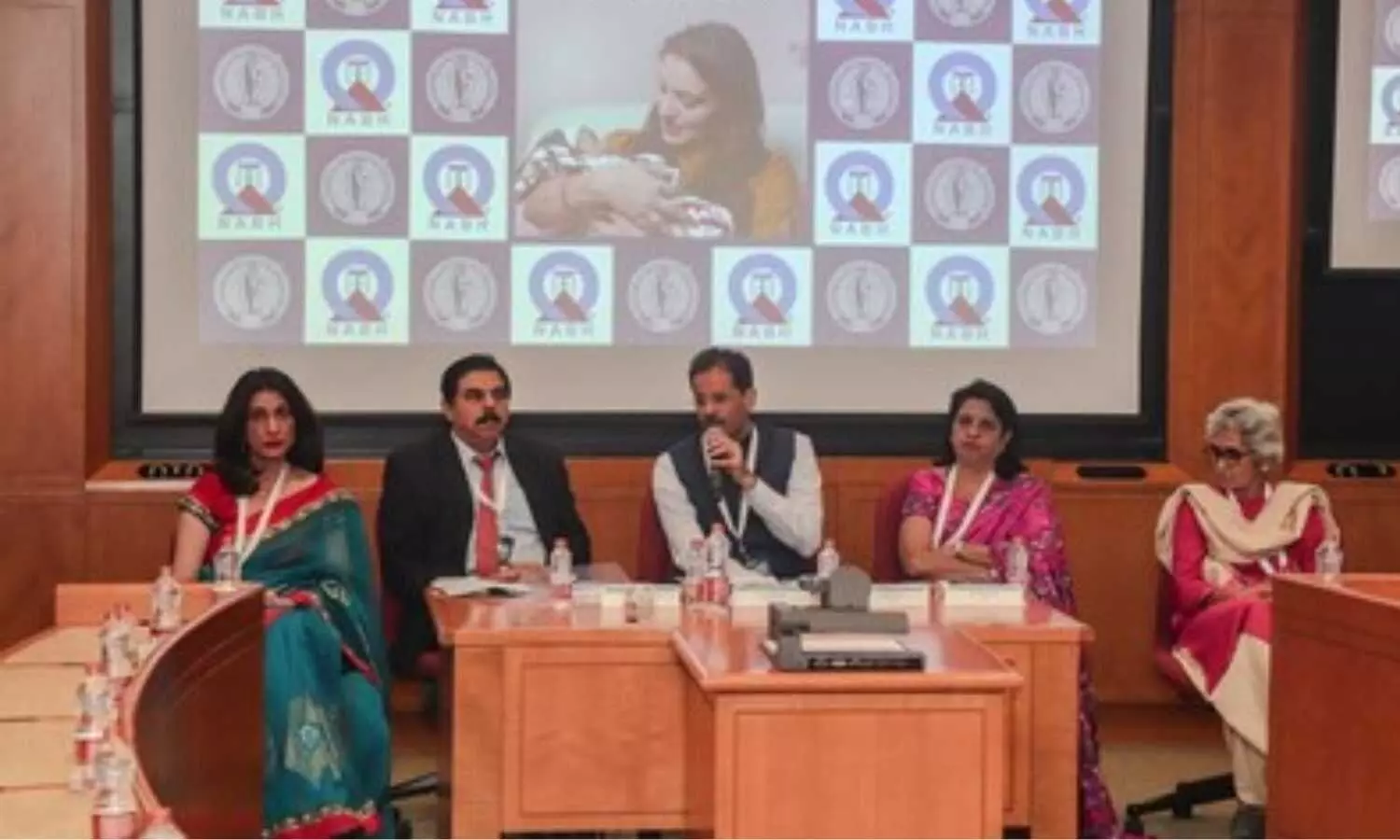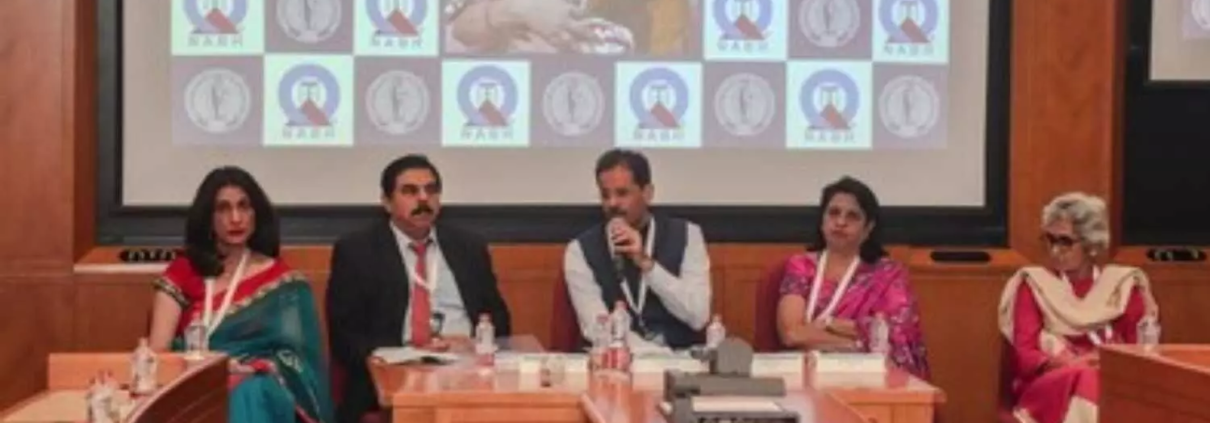NABH adopts FOGSI’s Manyata maternal health standards in certification programs

Mumbai: In an effort to enhance maternal healthcare services and support the goal of achieving Universal Health Coverage, the National Accreditation Board for Hospitals & Healthcare Providers (NABH) has integrated The Federation of Obstetric and Gynaecological Societies of India (FOGSI)’s Manyata maternal health quality standards across NABH Certification programs.
According to the PTI report, this move forms part of a strategic collaboration inked in 2022 between NABH and FOGSI, to improve the quality of maternity services and advance the Indian government’s vision of ‘One Nation One Standard’. By promoting standardization in maternal healthcare through the adoption of uniform standards nationwide, the collaboration will drive systemic improvements and contribute to efforts to achieve Universal Health Coverage.
Manyata is FOGSI’s flagship quality improvement and certification initiative that acts as a stamp of quality ensuring consistent, safe, and respectful care for mothers during and after childbirth. It promotes the adoption of evidence-based clinical standards based on the World Health Organization’s (WHO) standards of quality care in maternal health for antenatal, intrapartum, and postpartum care.
Also Read:Apollo Clinic secures NABH certification for its clinics in Karnataka
To launch the collaboration, a pilot program was conducted where 200 private maternity facilities trained on Manyata standards were assessed by NABH assessors, who were specifically onboarded and trained for this purpose by FOGSI. The pilot results showed consistent certification success rates whether facilities were assessed by FOGSI or NABH assessors.
Moving forward, facilities pursuing NABH Entry-Level certification will be able to achieve dual certifications for NABH and Manyata, validating their compliance with both national healthcare standards and specialized maternity care protocols, with the NABH HOPE portal providing a digital platform for application processing and assessments. Additionally, leveraging its network, FOGSI will identify assessors who will be trained by NABH to create a dedicated pool of NABH assessors specializing in obstetrics and gynaecology.
Reflecting on the announcement, Mr Rizwan Koita, Chairman of NABH said, “Uniform standards are crucial for ensuring that every mother receives consistent care, regardless of where she delivers. By incorporating Manyata guidelines into NABH certification programs, we are not only strengthening our accreditation framework, but also setting a new benchmark for maternal health.
This standardization will play a vital role in transforming maternal care across India. In addition, NABH will incorporate maternal health guidelines into NABH Digital Health Standards for Hospitals and HIS/EMR Systems engaged in mother and childcare.”
Dr Madhuri Patel, Secretary General, FOGSI said, “With 1.3 million Indian women having lost their lives to maternal causes over the past two decades, and despite a 70% overall decline in maternal mortality rates, there is a need to accelerate the progress. To achieve the UN’s 2030 Sustainable Development Goals and realize universal health coverage, we must deepen our resolve to bolstering healthcare systems. By harnessing the power of collaborations we can standardize care protocols, improve service delivery, and create sustainable solutions that enhance maternal healthcare accessibility.”
Dr Hrishikesh D. Pai, Trustee, FIGO Asia Oceania, Immediate Past President, FOGSI, and Chief Administrator, FOGSI-Manyata initiative, remarked, “The collaboration between FOGSI and NABH represents a pivotal step towards fostering a culture of excellence, accountability, and patient-centric care in the private healthcare sector. We are dedicated to building on this success and broadening the impact of the initiative. It will not only encourage wider adoption of best practices but also forge a path towards a future where every childbirth experience is safe, supported and dignified”, news agency PTI reported.
Dr Rishma Pai, Former President, FOGSI said, “By embedding Manyata’s comprehensive protocols into NABH’s certification guidelines, we aim to create a robust, unified system that elevates the quality of maternal care across the board. Expanding access to quality healthcare and standardizing the care delivered is not merely a goal but a moral imperative-one that will ensure the safety of every mother and child who visit these facilities.”
Preventable maternal deaths continue to be a significant concern in India. The announcement promises a welcome step towards addressing the issue. Establishing standardized care protocols in the healthcare sector is critical to enhance the delivery of maternal care in India, helping achieve better health outcomes.
Additional quotes from key stakeholders, who are not present in the room but have shared their perspectives, are included below:
Dr. Atul Mohan Kochhar, CEO of NABH said, “The integration of Manyata’s standards into our accreditation process marks a transformative step toward enhancing safe maternal healthcare. This collaboration allows us to align our efforts with FOGSI’s expertise, ensuring that accredited hospitals meet comprehensive maternal health protocols. Our aim is to create a sustainable model for quality accreditation that benefits mothers and newborns nationwide.”
Dr. Hema Divakar, National Convener, FOGSI-Manyata initiative said, “This announcement reflects FOGSI and NABH’s shared vision of ensuring that every mother, regardless of her circumstances, receives the compassionate and exceptional care she deserves.
Through a joint Technical Working Group, with members from FOGSI and NABH, we are working to streamline the quality standards to ensure they represent an ideal blend of infrastructure and labor room compliance, serving the best interests of mothers and newborns. This strategic alignment not only reinforces our commitment to patient safety and clinical excellence but also highlights the benefits of a unified approach to delivering high-quality, standardized care.”
Also Read:First in Vadodara: Parul Sevashram Hospital achieves NABH Platinum Level Digital Accreditation


